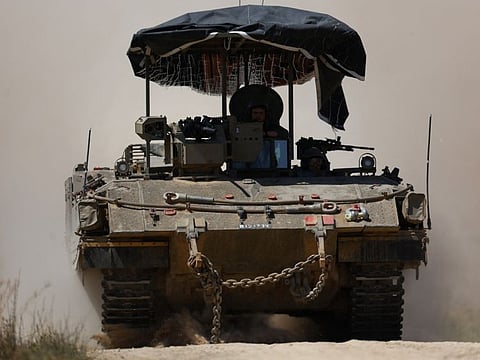Israel boosts defences after Iran revenge threat
Military calling up more reservist soldiers, all leave of soldiers will be paused

“In accordance with the situational assessment, it has been decided that leave will be temporarily paused for all IDF (Israel Defence Forces) combat units,” the military said in a statement.
“The IDF is at war and the deployment of forces is under continuous assessment according to requirements,” it said.
On Wednesday, the military said it had drafted reservists to boost aerial defences. Reuters journalists and Tel Aviv residents said on Thursday that GPS services had been disrupted, an apparent measure meant to ward off guided missiles.
Iran has vowed revenge for the killing of two of its generals along with five military advisers in an airstrike on an Iranian diplomatic compound in the Syrian capital Damascus on Monday.
It was widely believed to be an Israeli attack, one of the most significant yet on Iranian interests in Syria, which Israel has neither confirmed nor denied and which carries the risk of further inflaming the region.
Since then, investors have been on edge. The Tel Aviv Stock Exchange’s main TA-125 share index fell another 2.2 per cent on Thursday to extend losses this week to around 4 per cent. The shekel was 0.6 per cent weaker versus the dollar at a 3.73 rate and government bond prices were down as much as 0.4 per cent.
Israel has been pressing its war on Hamas for six months, after the Palestinian Islamist group led an attack on southern Israel on October 7, and has also been trading fire almost daily with Iran-backed Hezbollah in Lebanon.
Until now, Iran has avoided directly entering the fray, while supporting allies’ attacks on Israeli and US targets.
Amos Yadlin, a former Israeli intelligence chief, said Iran may choose this Friday - the last in Ramadan and Iranian Quds (Jerusalem) Day - to respond to the Damascus strike, either directly or through a proxy.
“I will not be surprised if Iran will act tomorrow. Don’t panic. Don’t run to the shelters,” said Yadlin, a Senior Fellow at the Kennedy School’s Belfer Center at Harvard University, citing Israel’s aerial defence systems.
“Be tuned for tomorrow and then, depending on the consequences of the attack, it may escalate,” Yadlin said.
Iran’s Supreme leader Ayatollah Ali Khamenei vowed in a social media message that “with God’s help we will make the Zionists repent of their crime of aggression against the Iranian consulate in Damascus”.
The mounting regional violence means it is “unlikely a war in the north can be avoided”, Emmanuel Navon, a political science professor at Tel Aviv University told AFP.
The Gaza war began with Hamas’s October 7 attack, which resulted in the deaths of about 1,170 Israelis and foreigners, mostly civilians, according to an AFP tally based on Israeli official figures.
Israel will be slapped: Khamenei
Palestinian militants also took more than 250 hostages, and 130 remain in Gaza, including 34 who the army says are dead.
Israel’s retaliatory campaign has killed at least 33,037 people, mostly women and children, according to the health ministry in Hamas-run Gaza.
Iran’s Supreme leader Ayatollah Ali Khamenei said on Wednesday that Israel would “be slapped” after an air strike on the Iranian consular annex in Damascus killed seven Revolutionary Guards, two of them generals.
“The defeat of the Zionist regime in Gaza will continue and this regime will be close to decline and dissolution,” Khamenei said in a speech to the country’s officials in Tehran.
“Desperate efforts like the one they committed in Syria will not save them from defeat. Of course, they will also be slapped for that action,” he added.
Iranian state media said 13 people were killed in the strike in which, according to Tehran’s ambassador, Israeli F-35 jets fired six missiles that levelled the five-storey consular building adjacent to the embassy.
Israel says foiled plot to kill far-right minister Ben Gvir
Israeli security services, meanwhile, said they had foiled a plot to kill the country’s far-right National Security Minister Itamar Ben Gvir.
Eleven people including seven Palestinian Israeli citizens were arrested in the joint operation with the police and the army, the internal security service Shin Bet said.
“Shin Bet dismantled a terrorist cell that was preparing attacks in Israel, notably against the Minister Itamar Ben Gvir,” the agency said in a statement, nearly six months into Israel’s war against Hamas militants in the Gaza Strip.
They said the suspects had planned to kill Ben Gvir with a rocket launcher.
“The cell had (also) planned attacks against military bases, Ben Gurion Airport and government offices in Jerusalem,” it added.
Ten of the suspects were charged at a court in Beersheva in the south of the country on Thursday, the security service said.
Ben Gvir, who heads the Jewish Power party, is known for his inflammatory rhetoric against Palestinians.
In February he called for stricter controls on Palestinians in the West Bank - where he is a settler - saying they “should not be allowed” into Jerusalem to pray during Ramadan.



